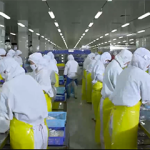Profitability in shrimp sector depends on sustainability, says Boston Consulting Group

Global shrimp producers' long-term profitability depends on carefully instituting reforms to increase sustainability and lower risk – a lesson that can be garnered from the experiences of Thailand, Vietnam, Indonesia, and India, according to a new series of reports.
The reports, published by Boston Consulting Group, examine those four major shrimp producing countries and offer recommendations that can help shrimp producers and traders around the world increase productivity and efficiency while becoming more sustainable.
In today’s fast-changing market for shrimp, some countries are moving ahead while others are falling behind. Thailand and Vietnam have ceded ground to competitors in the last decade, according to Boston Consulting Group. Both countries were able to rapidly increase production, but did not take sufficient care to mitigate disease risk or biosecurity hazards.
"By adjusting production measures now, shrimp producers can avoid likely future disease risks and ensure long-term sustainable growth," Alexander Meyer zum Felde, Boston Consulting Group’s associate director of total societal impact and sustainability and circular economy, told SeafoodSource.
Countries should also try to avoid negative environmental impacts that will damage the industry over time, Meyer zum Felde said. For instance, mangrove deforestation – a common side-effect of increasing the footprint of shrimp aquaculture operations – increases flood risk, while poor water treatment increases the risk of disease.
At the local level, shrimp producers have already started to recognize the potential issues and are improving water systems and installing renewable energy systems, along with using feed that enhances health.
But more is needed, and Boston Consulting Group recommends a collaborative effort dedicated to long-term, inclusive sustainability, with industry players cooperating on a large scale. In particular, full traceability will benefit the whole value chain – encouraging more efficient farms and sustainable practices, enhancing brands, and giving opportunities for premium pricing. Blockchain-based tracking holds special promise, and large supermarkets such as Walmart and Carrefour already use blockchain to track certain products.
Since the year 2000, global production of shrimp has tripled, and is expected to grow 6 percent per year. Shrimp is no longer considered a luxury product and is increasingly popular in low-income countries. By 2020, Indonesia's domestic market for shrimp will be equal to 45 percent of the country's production, Meyer zum Felde said.
"As the global population and consumer affluence grow, farm-raised shrimp represents an increasingly important source of protein around the world," Meyer zum Felde said. "One of the countries contributing to this growth is the U.S. In the U.S. alone, the average annual consumption of shrimp has risen to four pounds per capita."
Shrimp farmers can lower their risk by improving biosecurity standards, avoiding overstocking, and using better feed. Indoor closed-loop systems require less land and can be built near consumers, preventing mangrove deforestation. The indoor systems also allow production to take place all year, providing high-quality commodity shrimp throughout the year.
"Different pond types and ideally indoor closed-loop systems offer the opportunity of higher yields and reduced operational risks thanks to higher biosecurity standards," Meyer zum Felde said. Those systems allow "complete control over inputs, lower disease rates, smaller land requirements, improved water treatment, and efficient feed use."
Each of the four countries examined in the reports offer different lessons, and Boston Consulting Group recommended specific actions for each.
In 2012, Thailand was the world's second-largest producer of shrimp. It has since lost more than half its market share because of disease outbreaks, export bans, and trade restrictions. The country's global share of shrimp production fell from 18 percent in 2012 to 8 percent in 2017 and today, the country comes in sixth among shrimp-producing nations. Boston Consulting Group suggests that rebranding Thai shrimp as a sustainable option could give it access to a rapidly expanding niche market. Implementing comprehensive traceability will be required to regain access to lost markets.
In the early 2010s, Vietnam was third among shrimp producers, behind only China and Thailand, but has since fallen to fifth because of disease outbreaks, low productivity, and import restrictions. Low production in the country has forced processors to import shrimp to fill processing capacity, and export refusals due to drug contamination hamstring business. But Boston Consulting Group believes there is a USD 300 million (EUR 276 million) potential to boost annual export value.
The decline of Thailand and Vietnam has allowed India and Indonesia to become the second- and third-largest shrimp producers in the world. But environmental risks and tightening regulations could weaken their positions.
India's shrimp farming industry has grown 23 percent in recent years to become the world's second largest producer of shrimp. Rising land costs and low shrimp survival rates threaten India's success, while limited processing facilities leave the industry vulnerable. Boston Consulting Group predicts that current industry profitability will lead to a reluctance to embrace change, even as market competitors adapt fast.
Indonesia's strong domestic and international demand have allowed it to become the third-largest producer globally. But global price declines are pressuring the industry and complacency could cause the industry to lose access to the U.S. market, its largest export market, while mangrove deforestation remains a pressing issue.
Photo by Chris Chase/SeafoodSource






Share